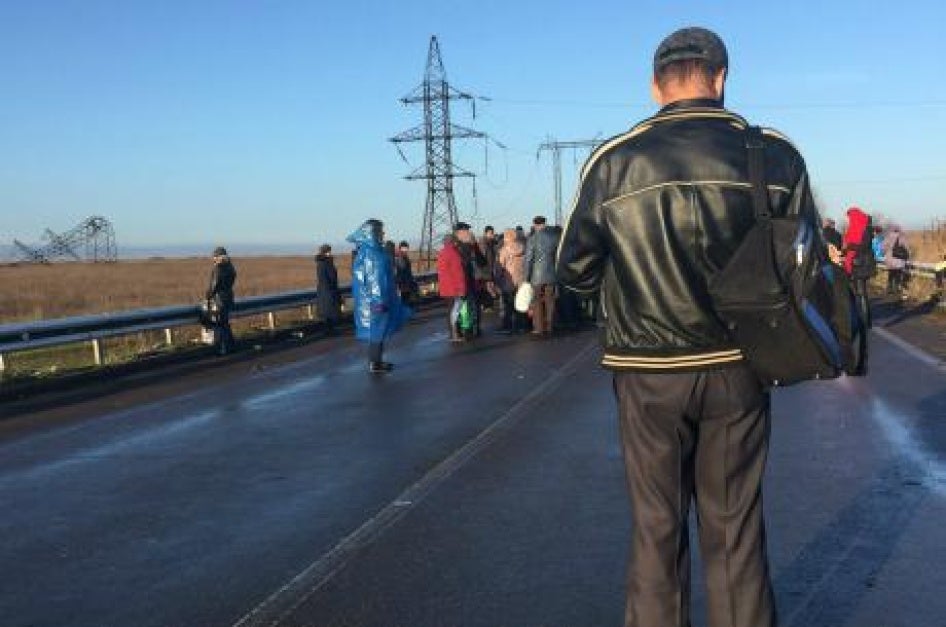I get out of bed at 5 a.m., just as the curfew is being lifted in Donetsk, the capital of the self-proclaimed Donetsk People’s Republic (DNR) in eastern Ukraine. It’s pitch dark outside and I feel privileged — really and truly privileged — to be able to afford to pay $25 for three extra hours of sleep and a significant risk reduction. My fellow travel companions crossing from rebel-controlled territory to government-controlled areas, I realise, had to leave their homes during curfew and spend half the night parked in the “neutral zone,” between DNR and government checkpoints, fully exposed to the dangers of nightly shooting and shelling. Backpack zipped-shut, I go downstairs and get into a taxi, which will drop me off at the last rebel-controlled checkpoint. From there, I’ll just walk through the “neutral zone” on the lookout for my “ferryman”.
“Ferrymen” take people from rebel-controlled areas to government controlled territory and back. As of 2015, Ukraine’s government established strict controls over crossing to and from rebel-controlled areas. The government of course has the right to control such movement, but the way the crossing system works results in tremendous difficulties for many civilians who already bear considerable hardships after the nearly three-year armed conflict.
According to Ukraine’s State Border Service, 26,000-32,000 people cross the line of contact daily. The UN estimates the overall population of separatist-controlled areas at 2.7 million, and many of these people travel to government-controlled areas on a regular basis. Some of the most frequent travelers have jobs or business deals on the other side of the line. Others go there to visit relatives, process ID and other documents, and even buy groceries, the prices on meat and produce being much higher in rebel-controlled areas. Many people who fled to other parts of Ukraine proper during the war travel to rebel-held territory to check on their homes, see their families and assess the prospects for return.
Yet there are only five crossing checkpoints —and one is minuscule and only for foot traffic — to accommodate the tens of thousands of daily travelers. This results in humongous queues, with people waiting for hours and sometimes overnight, to travel a distance that, technically speaking, is negligible.
Today, I’m traveling from central Donetsk to its immediate suburb, government-controlled Mariinka. Before the war and even during its first months, the trip would take about 30 minutes. Now, God willing, it will take me four hours, provided the crossing checkpoint operates on a normal schedule. But again, I’m privileged — my fellow travelers had to leave three hours ahead of me to get a spot at the front of the crossing queue.
The Ukrainian authorities have banned regular bus service or other public transportation between rebel-controlled and government-controlled territories. Hence, the “ferrymen” who deliver passengers in large vans, eight people per vehicle, pretending that they’re ferrying friends and family members. The pretense is pretty transparent, but some palm-greasing ensures smooth passage. The ferrymen use their palm-greasing skills on the other side of the border as well, so they can get away with breaking curfew and avoid getting the passengers searched and harassed at “zero”, or the last DNR checkpoint.
The ferrymen have collected their passengers from across Donetsk and the outskirts between 2 and 3 a.m., aiming to make it through the “zero” checkpoint and into the “neutral zone” by around 3:30. This way, they won’t be at the very front of the queue for Ukraine’s crossing checkpoint, as there are always some people who did not get through the day before and stayed there overnight. But if all goes as planned, they should be close enough to get through sometime between 9 and 10 a.m. Ukraine opens its crossing checkpoints at 8 a.m., which is 9 a.m. in rebel-controlled areas between mid-October and mid-April. Like Russia, the rebels don’t switch to winter time.
Accordingly, the ferrymen and their passengers spend at least six hours, including several hours before dawn, in the “neutral zone”. It’s between dusk and dawn that the warring sides frequently fire, so all people traveling this itinerary at this hour are at serious risk. Moreover, no aid organisations are allowed into the “neutral zone,” and the warring sides clearly have not been thinking about installing sanitary and other facilities on that stretch of the road. The “neutral zone” has no toilets, portable water, heaters, tents, or sources of light. It has nothing really, except heavily mined fields on the both sides.
At 6:30 a.m., I’m walking through a throng of vehicles “in the neutral zone” toward my ferryman’s van. The queue is already large and dense, with the cars parked extremely close to one another, so as not to leave any space for latecomers attempting to jump the queue.
As I’m walking ahead, a posh black jeep takes a plunge onto the muddy roadside and drives on the mined field parallel to the road, attempting to sneak into the line of cars at the front of the queue. This past spring, a bus performing a similar trick blew up on a mine on government controlled territory, next to the Maiorsk check-point, killing four people and wounding 19. The memory of that tragedy is still fresh, but the frustration of waiting is so intense that some take the risk. The jeep finds a tiny opening, climbs up, but gets was pushed down back into the mud by several angry men dead set on not letting anyone break the rules. The despondent driver eventually turns around, and heads back.
As I find my van, more and more cars arrive. Also, lots more people on foot or bicycle join the “pedestrian” queue upfront, on the left side of the road. Among them are the elderly and the frail. Two old men lean painfully on their crutches. Small kids whimper from cold, exhaustion and sheer boredom. Some people hold onto their bags the whole time, others, whose bags are too heavy or who simply don’t have the energy, drop them in the mud. It rained all night, the road is still wet.
Though we’re lucky with the weather and it’s a few degrees above zero, two hours later I’m chilled to the bone. It is mind-blowing to think of people standing like this for hours in sub-zero temperatures, icy wind, freezing rain or snow, or under blazing sun in boiling summer heat.
As it gets later, people are getting increasingly uncomfortable. More and more men turn to face the roadside and urinate with their back to the crowd. Some women, including the elderly ones, make their way into the field— yes, the minefield — and squat in full view of the crowd, as there are no bushes or trees to hide behind. It’s dangerous and degrading. But do they really have a choice?
When the government crossing checkpoint finally opens, I claim my seat in the van next to a stylish woman in her mid-forties. She is artfully made up and coiffed, and looks astonishingly well put together for someone who spent half the night in an overcrowded vehicle on a dangerous road. She is also sporting a pristine white wool coat cinched at the waist and shiny knee-high boots, making me realise my jacket and shoes are splotched with mud.
As I apprehensively slide to the very edge of the seat to avoid fouling my neighbor’s immaculate clothes, she starts muttering about the desperate need to empty her bladder. She describes how when she got up at 2 a.m. she purposefully did not drink anything and how she sat on the toilet for a few minutes trying to express urine “to the last drop” because she knew what she “is in for”. But it’s been over six hours already, and she is “just dying”. After 15 minutes of moaning, she jumps up, “I cannot help it any more. I’m about to burst. Could you please come with me?” - “You want to brave the field?” I ask warily. - “No, not that. See this tiny space between our van and the next one? I’ll squat there but please stay next to me so that the men don’t come and stare.”
All numb, I descend into the stretch of mud between the two vehicles and watch my chic companion hold the snow-white flaps of her coat with one hand, and pull down her pantyhose with the other. But the endless queue of cars suddenly starts moving. “Into the van!” yells the driver, and both of us scramble back inside. It takes another 45 minutes to make the crossing to government-controlled territory and reach the first roadside toilet. By mute agreement, the passengers in our van let the woman in white go first.
It’s a war zone and as with any war, some of the easiest things suddenly become precarious and hard to accomplish. However, the warring sides have the obligation to protect civilians and respect their dignity. Opening additional checkpoints to speed up the crossing may be difficult and time consuming, but putting up sanitation facilities, heaters and tents is something that can and should be done without delay. It will make a huge difference to thousands of people, people whose safety and dignity are being lost.









